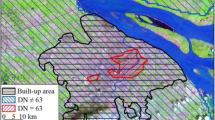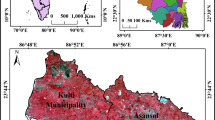Abstract
Urbanization induces shifts in surface environmental factors, including impervious surface expansion, green space loss, and temperature increase in which the extreme temperature is supposed to significantly raise total electricity consumption (TEC) in urban areas. Applying remote sensing data and data analysis, this study aims to explore relationships between urbanization, surface environmental factors (SEF), and electricity consumption (EC). The relevance of surface temperature and total electricity consumption was also considered. The research found the disturbance of SEF through changes in vegetation index, urban index, and surface temperature. The vegetation was detected to be narrowed while the impervious surface and land surface temperature had the same trend of rising. These tendencies correspond to the urbanization process in the Bangkok Metropolitan Area (BMA). The urbanization process was also detected by extension of customers and electricity consumption, mainly in industrial sectors and household consumption. The number of users in industrial sectors well explained total consumption. Besides, the surface environmental factors jointly contributed to the consumption in the residential sector. Urban expansion assessed by urban index has more contribution to electricity utilization compared to surface temperature. These findings proved that the total consumption originated from the industrial sectors, especially the medium and large scales. These outcomes can serve the electrical business in order to provide adequate and improve service quality.





Similar content being viewed by others
References
Al-Bajjali SK, Shamayleh AY (2018) Estimating the determinants of electricity consumption in Jordan. Energy 147:1311–1320. https://doi.org/10.1016/j.energy.2018.01.010
Arifwidodo S, Chandrasiri O (2015) Urban Heat Island and household energy consumption in Bangkok, Thailand. In: 2015 International Conference on Alternative Energy in Developing Countries and Emerging Economies. Elsevier B.V., pp 189–194
Bhatti SS, Tripathi NK (2014) Built-up area extraction using Landsat 8 OLI imagery. GIScience Remote Sens 51:445–467. https://doi.org/10.1080/15481603.2014.939539
BMA (2017) Bangkok profile. In: Bangkok Metrop. Adm. http://www.bangkok.go.th/main/page.php?&340&l=en. Accessed 11 Jan 2018
Burgan RE, Hartford RA (1993) Monitoring vegetation greenness with satellite data, Ogden
Busetto L, Ranghetti L, Wasser L, Hanson J (2019) A tool for automating download and preprocessing of MODIS land products data (MODIStsp)
Fan JL, Zhang YJ, Wang B (2017) The impact of urbanization on residential energy consumption in China: an aggregated and disaggregated analysis. Renew Sust Energ Rev 75:220–233. https://doi.org/10.1016/j.rser.2016.10.066
Fu P, Weng Q (2016) A time series analysis of urbanization induced land use and land cover change and its impact on land surface temperature with Landsat imagery. Remote Sens Environ 175:205–214. https://doi.org/10.1016/j.rse.2015.12.040
GGWS El Niño and La Niña years and intensities. In: Golden Gate Weather Serv https://ggweather.com/enso/oni.htm. Accessed 16 Feb 2020
Hassan MM (2017) Monitoring land use/land cover change, urban growth dynamics and landscape pattern analysis in five fastest urbanized cities in Bangladesh. Remote Sens Appl Soc Environ 7:69–83. https://doi.org/10.1016/j.rsase.2017.07.001
Karaman B (2019) Bangkok’s electricity consumption hits new record high. In: Thail. Bus. News. https://www.thailand-business-news.com/environment/72026-bangkoks-electricity-consumption-hits-new-record-high.html. Accessed 3 Jun 2019
Keivani R (2010) A review of the main challenges to urban sustainability. Int J Urban Sustain Dev 1:5–16. https://doi.org/10.1080/19463131003704213
Koen V, Asada H, Rizwan M, Rahuman H (2018) Boosting productivity and living standards in Thailand. OECD Econ Dep Work Pap. https://doi.org/10.1787/e525c875-en
LAADS DAAC (2019) Terra & Aqua Moderate Resolution Imaging Spectroradiometer (MODIS). In: Level-1 Atmos. Arch. Distrib. Syst. Distrib. Act. Arch. Cent. https://ladsweb.modaps.eosdis.nasa.gov/missions-and-measurements/modis/. Accessed 18 May 2019
LDD (2012) Land use map in central plain of Thailand 2010–2012. In: L. Dev. Dep. http://www.ldd.go.th/ldd_en/en-US/map/map-details/land-use-in-the-central-region/1/. Accessed 15 Feb 2020
Liu X, Sun T, Feng Q, Zhang D (2020) Dynamic nonlinear influence of urbanization on China’s electricity consumption: evidence from dynamic economic growth threshold effect. Energy 196:117187. https://doi.org/10.1016/j.energy.2020.117187
LP DAAC Terra Land Surface Temperature/Emissivity Monthly L3 Global 6 km SIN Grid. In: L. Process. Distrib. Act. Arch. Cent. https://lpdaac.usgs.gov/products/mod11b3v006/. Accessed 18 May 2019a
LP DAAC Terra Vegetation Indices Monthly L3 Global 1 km SIN Grid. In: L. Process. Distrib. Act. Arch. Cent. https://lpdaac.usgs.gov/products/mod13a3v006/. Accessed 18 May 2019b
Lu D, Weng Q (2006) Use of impervious surface in urban land-use classification. Remote Sens Environ 102:146–160. https://doi.org/10.1016/j.rse.2006.02.010
Malik MS, Shukla JP, Mishra S (2019) Relationship of LST, NDBI and NDVI using landsat-8 data in Kandaihimmat watershed, Hoshangabad, India. Indian J Geo Marine Sci 48:25–31
MEA (2013) Annual Report 2013. “Leveraging for tomorrow.” Bangkok metropolis
MEA (2016) Sustainability report 2016. Move forward to Smart Metro. Bangkok metropolis
Mohan M, Kandya A (2015) Impact of urbanization and land-use/land-cover change on diurnal temperature range: a case study of tropical urban airshed of India using remote sensing data. Sci Total Environ 506–507:453–465. https://doi.org/10.1016/j.scitotenv.2014.11.006
Mukaka MM (2012) A guide to appropriate use of correlation coefficient in medical research. Malawi Med J 24:69–71. https://doi.org/10.1016/j.cmpb.2016.01.020
Murakamia A, Zain AM, Takeuchi K et al (2005) Trends in urbanization and patterns of land use in the Asian mega cities Jakarta, Bangkok, and Metro Manila. Landsc Urban Plan 70:251–259. https://doi.org/10.1016/j.landurbplan.2003.10.021
NASA EOSDIS How To: Use the download access script. In: Earth Data Wiki. https://wiki.earthdata.nasa.gov/display/EDSC/How+To%3A+Use+the+Download+Access+Script. Accessed 18 May 2019
Ostro B, Chestnut L, Vichit-Vadakan N, Laixuthai A (1999) The impact of particulate matter on daily mortality in Bangkok, Thailand. J Air Waste Manage Assoc 49:100–107. https://doi.org/10.1080/10473289.1999.10463875
Pongsapich A, Wongsekiarttirat W (1994) Urban household energy consumption in Thailand. Energy 19:509–516
Rasul A, Balzter H, Smith C (2015) Spatial variation of the daytime surface urban cool island during the dry season in Erbil, Iraqi Kurdistan, from Landsat 8. Urban Clim 14:176–186. https://doi.org/10.1016/j.uclim.2015.09.001
Richard T (1990) Interpretation of the correlation coefficient: a basic review. J Diagnostic Med Sonogr 6:35–39. https://doi.org/10.1177/875647939000600106
Ruangwises S, Ruangwises N (2009) Occurrence of aflatoxin M1 in pasteurized milk of the School Milk Project in Thailand. J Food Prot 72:1761–1763. https://doi.org/10.4315/0362-028X-72.8.1761
Santamouris M, Cartalis C, Synnefa A, Kolokotsa D (2015) On the impact of urban Heat Island and global warming on the power demand and electricity consumption of buildings–a review. Energy Build 98:119–124. https://doi.org/10.1016/j.enbuild.2014.09.052
Shahbaz M, Sbia R, Hamdi H, Ozturk I (2014) Economic growth, electricity consumption, urbanization and environmental degradation relationship in United Arab Emirates. Ecol Indic 45:622–631. https://doi.org/10.1016/j.ecolind.2014.05.022
Silvani D (2019) Zonal statistics for multiband raster
Srivanit M (2012) Assessing the impact of urbanization on urban thermal environment: a case study of Bangkok metropolitan. Int J Appl Sci Technol 2:243–256
Srivanit M, Hokao K, Phonekeo V (2012) Assessing the impact of urbanization on urban thermal environment: a case study of Bangkok metropolitan. Int J Appl Sci Technol 2:243–256
Sun Q, Wu Z, Tan J (2012) The relationship between land surface temperature and land use/land cover in Guangzhou, China. Environ Earth Sci 65:1687–1694
Tontisirin N, Phoomikiattisak D, Anantsuksomsri S (2017) Land use change in the eastern economic corridor of Thailand: an application of cellular automata-Makov Model. In: The 54th Annual Meeting of the Japan Section of the RSAI. pp 1–7
Tsuchiya K, Hara Y, Thaitakoo D (2015) Linking food and land systems for sustainable peri-urban agriculture in Bangkok Metropolitan Region. Landsc Urban Plan 143:192–204. https://doi.org/10.1016/j.landurbplan.2015.07.008
Tucker CJ (1979) Red and photographic infrared linear combinations for monitoring vegetation. Remote Sens Environ 8:127–150. https://doi.org/10.1016/0034-4257(79)90013-0
Ubani O (2013) Determinants of the dynamics of electricity consumption in Nigeria. OPEC Energy Rev 37:149–161. https://doi.org/10.1111/opec.12004
US EPA (2008) Urban heat island basics. In: Reducing urban heat islands: compendium of strategies. Washington, DC: U.S. Environmental Protection Agency
Wangpattarapong K, Maneewan S, Ketjoy N, Rakwichian W (2008) The impacts of climatic and economic factors on residential electricity consumption of Bangkok Metropolis. Energy Build 40:1419–1425. https://doi.org/10.1016/j.enbuild.2008.01.006
Weng Q, Lu D (2008) A sub-pixel analysis of urbanization effect on land surface temperature and its interplay with impervious surface and vegetation coverage in Indianapolis, United States. Int J Appl Earth Obs Geoinf 10:68–83. https://doi.org/10.1016/j.jag.2007.05.002
World Bank Thailand (2016) Getting back on track: reviving growth and securing prosperity for all. Thailand Systematic Country Diagnostic. World Bank Group, Washington
Yamtraipat N, Khedari J, Hirunlabh J, Kunchornrat J (2006) Assessment of Thailand indoor set-point impact on energy consumption and environment. Energy Policy 34:765–770. https://doi.org/10.1016/j.enpol.2004.07.009
Yang Y, Liu J, Lin Y, Li Q (2019) The impact of urbanization on China’s residential energy consumption. Elsevier B.V
Zha Y, Gao J, Ni S (2003) Use of normalized difference built-up index in automatically mapping urban areas from TM imagery. Int J Remote Sens 24:583–594. https://doi.org/10.1080/01431160304987
Zhang Y, Odeh IOA, Han C (2009) Bi-temporal characterization of land surface temperature in relation to impervious surface area, NDVI and NDBI, using a sub-pixel image analysis. Int J Appl Earth Obs Geoinf 11:256–264. https://doi.org/10.1016/j.jag.2009.03.001
Zhang M, Zhang K, Hu W, Zhu B, Wang P, Wei YM (2020) Exploring the climatic impacts on residential electricity consumption in Jiangsu, China. Energy Policy 140:111398. https://doi.org/10.1016/j.enpol.2020.111398
Zou KH, Tuncali K, Silverman SG (2003) Statistical concepts series: correlation and simple linear regression. Radiology 227:617–622. https://doi.org/10.1148/radiol.2273011499
Acknowledgments
This study is a part of the first author’s research in his intern scholarship at KMUTT Geospatial Engineering and Innovation Center (KGEO), Faculty of Science, King Mongkut’s University of Technology Thonburi, Thailand. We especially thank the kind support and suggestions of Dr. Pariwate Varnakovida and MSc. Sanwit Iabchoon (KGEO) during this research. We extend our gratitude to the Metropolitan Electricity Authority, Thailand for their primary data support. Finally, we would also like to thank the National Aeronautics and Space Administration (NASA) for the MODIS dataset used throughout this research.
Author information
Authors and Affiliations
Corresponding author
Additional information
Responsible editor: Philippe Garrigues
Publisher’s note
Springer Nature remains neutral with regard to jurisdictional claims in published maps and institutional affiliations.
Rights and permissions
About this article
Cite this article
Nguyen, C.T., Nguyen, D.T.H. & Phan, D.K. Factors affecting urban electricity consumption: a case study in the Bangkok Metropolitan Area using an integrated approach of earth observation data and data analysis. Environ Sci Pollut Res 28, 12056–12066 (2021). https://doi.org/10.1007/s11356-020-09157-6
Received:
Accepted:
Published:
Issue Date:
DOI: https://doi.org/10.1007/s11356-020-09157-6




